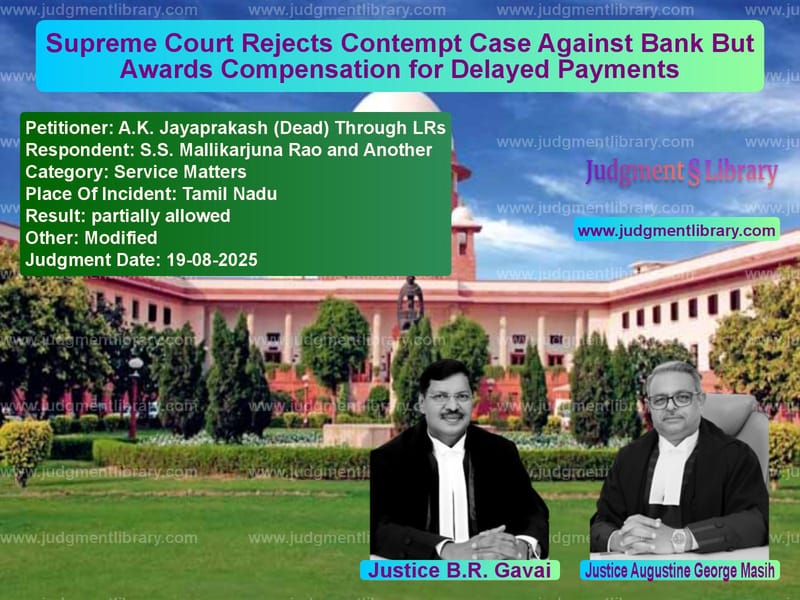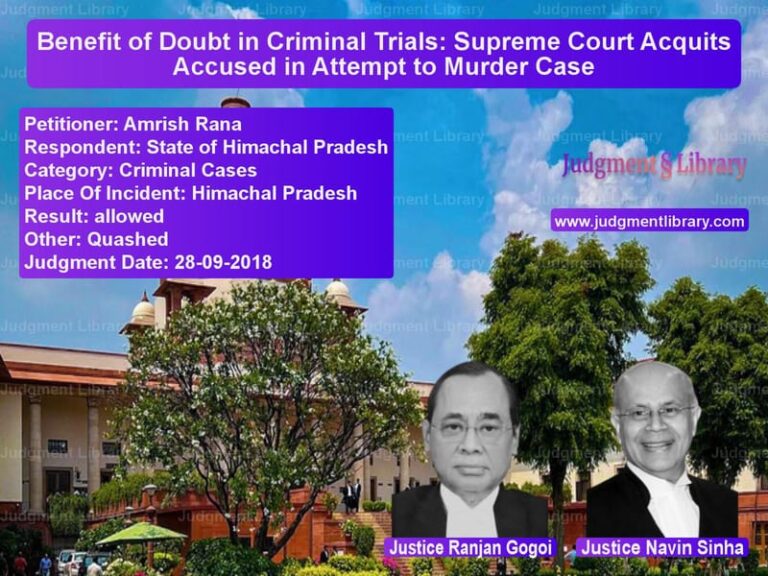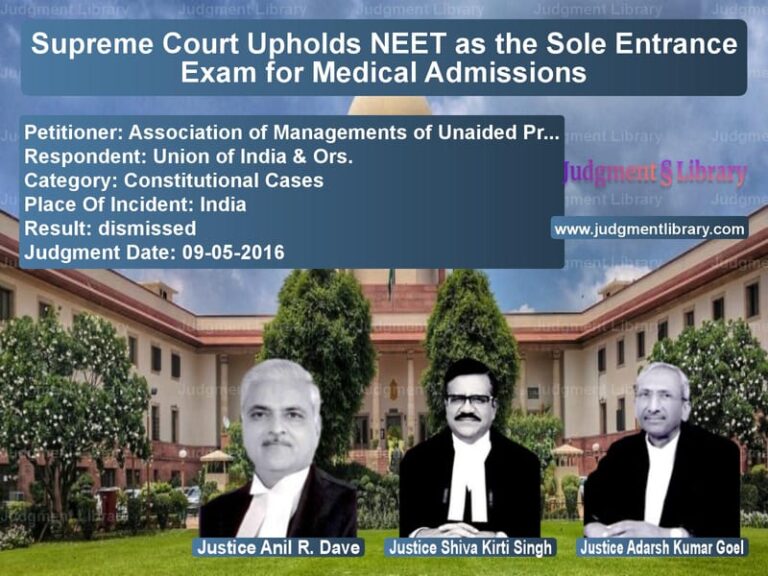Supreme Court Rejects Contempt Case Against Bank But Awards Compensation for Delayed Payments
In a nuanced judgment that balances the strict requirements of contempt law with the need for justice in delayed payment cases, the Supreme Court has declined to hold bank officials in contempt for delayed payments to a former employee while simultaneously awarding significant compensation to acknowledge the hardship caused by the delay. The case involving A.K. Jayaprakash (since deceased) and Punjab National Bank represents a classic example of how courts must distinguish between administrative delays and willful disobedience of court orders.
The legal saga began decades ago when A.K. Jayaprakash, who worked as Manager with Nedungadi Bank Ltd., was dismissed from service in 1985 on grounds of alleged irregularities in sanctioning loans, overdrafts, cheque discounting, and delay in reporting. What followed was a protracted legal battle that would span nearly four decades, outliving the employee himself and testing the limits of judicial patience with institutional delays.
The dismissal was initially challenged before the Deputy Commissioner of Labour under the Tamil Nadu Shops and Establishment Act, 1947, which set aside the dismissal order and reinstated Jayaprakash. After multiple rounds of litigation and remands, the matter eventually reached the Supreme Court through Civil Appeal Nos. 6732-6733 of 2009. On January 17, 2018, the Supreme Court delivered a concise but significant order: “Heard. We find no ground to interfere with the impugned judgment and order passed by the High Court. However, it is made clear that the outstanding amount be paid within a period of three months. Consequently, the appeals are dismissed. No order as to costs.”
The core issue before the Supreme Court in the contempt proceedings was whether the bank’s failure to make payments within the stipulated three-month period constituted willful disobedience warranting contempt action. The legal arguments presented revealed fundamentally different perspectives on the nature of the delay.
Learned Counsel for the Petitioner contended that “the respondent-Bank failed to comply with the explicit mandate of this Court directing payment within three months from 17.01.2018 i.e. the date of the order. It is submitted that the delay reflects wilful and deliberate disobedience.” The counsel further argued that “the Petitioner was entitled to pensionary benefits which were not paid, thereby further aggravating the contempt.”
On the opposing side, Learned Counsel appearing for the Respondents presented a different narrative, submitting that “the entire amount directed by this Court has been duly paid, albeit belatedly. The delay is sought to be explained on account of administrative difficulties arising out of the amalgamation of Nedungadi Bank Ltd. with Punjab National Bank and the non-availability of legacy records.” The bank’s counsel emphasized that “no direction as to the grant of pension was issued in the judgment dated 17.01.2018, and, therefore, the same cannot constitute the foundation for the present contempt.”
The factual record showed that payments were indeed made, but significantly delayed. The bank disbursed ₹16,11,330.52 as arrears of salary on March 4, 2019; ₹3,50,000 as gratuity on March 6, 2019; and provident fund dues in two installments of ₹2,16,438.34 and ₹1,82,633.70 in May and June 2019 respectively. All these payments came well beyond the three-month deadline set by the Supreme Court in its January 2018 order.
The Supreme Court, in its analysis, began by examining the fundamental principles of contempt jurisdiction. The Court referenced its earlier decision in Ashok Paper Kamgar Union v. Dharam Godha and Others, noting that “contempt jurisdiction is intended to uphold the majesty of law and not to settle personal grievances.” Similarly, in Rama Narang v. Ramesh Narang and Another, the Court had held that “in a case of civil contempt, the breach must be deliberate and intentional.”
Applying these principles to the facts at hand, the Court made a crucial distinction between administrative delay and willful disobedience. The judgment observed that “although the Bank did not effect payment within the time permitted by this Court, the material placed on record do not demonstrate that the delay in compliance was borne out of any wilful or contumacious intent. The explanation tendered refers to administrative hurdles post-merger and retrieval of records dating back over three decades. While such circumstances cannot justify laxity in complying with orders of this Court, the element of mens rea, essential for sustaining a charge of civil contempt, cannot be inferred merely from the factum of delay.”
The Court also addressed the pension claim that had been raised in the contempt proceedings. The judgment clearly stated that “insofar as the claim for pension is concerned, it is evident that no such relief was ever sought in the Civil Appeal Nos. 6732-6733 of 2009 or any other earlier proceedings or submissions moved by the Petitioner, nor was there any adjudication to the said effect by the courts below. Contempt jurisdiction is not a forum for asserting new claims or seeking substantive reliefs which were neither raised nor granted earlier.”
Referencing Jhareswar Prasad Paul and Another v. Tarak Nath Ganguly and Others, the Court reinforced that “contempt proceedings cannot be used to circumvent proper adjudication mechanisms. Accordingly, the prayer for pension cannot be entertained at this stage.”
However, in a display of judicial compassion and recognition of the extraordinary hardship suffered by the employee, the Supreme Court took note of the protracted nature of the litigation. The judgment poignantly observed that “it cannot be lost sight of that the Petitioner, who was dismissed in 1985 and secured favourable orders as early as 2004, attained the age of superannuation in or around 2006. Notwithstanding the final adjudication by this Court in 2018, the retirement dues lawfully accruing to him but remained undisbursed for over a decade.”
The Court acknowledged the human cost of such prolonged legal battles, stating that “the prolonged non-disbursal of funds, despite successive directions at various stages of the litigation, and the fact that litigation has remained pending since the 1980s, we are of the considered view that a reasonable lump sum payment is warranted, both in acknowledgement/recognition of the protracted delay in disbursal of the dues and to bring a quietus to future litigation by granting compensation.”
In its final directions, the Court struck a balanced approach. While discharging the contempt rule and rejecting the pension claim, the Court directed that “the respondent-Bank shall pay a sum of Rs. 3,00,000/- (Rupees Three Lakhs only) to Smt. Vimala Prakash, the widow of the deceased Petitioner and in her absence to the other legal representatives on record within a period of eight weeks from today failing which interest at the rate of 8% will be payable till the date of disbursement.”
This judgment represents a sophisticated understanding of contempt jurisprudence while demonstrating judicial empathy for litigants who suffer due to systemic delays. The Court recognized that while not every delay in compliance amounts to contempt requiring punitive action, significant delays in implementing court orders—especially in employment matters where individuals depend on these payments for their livelihood—warrant some form of compensatory relief.
The case also highlights the challenges that arise from bank mergers and acquisitions, where legacy issues and record-keeping problems can create substantial administrative hurdles. However, the judgment makes it clear that such administrative challenges cannot become excuses for indefinite delays in complying with judicial directives.
This balanced approach—refusing to invoke contempt jurisdiction in the absence of willful disobedience while simultaneously providing meaningful compensation for undue delay—sets an important precedent for similar cases where institutional delays cause significant hardship to individuals. It demonstrates that courts can uphold the dignity of judicial orders while also recognizing the practical realities of institutional functioning.
The judgment serves as a reminder to all institutions, particularly in the banking and financial sector, that while courts may understand administrative challenges, they expect diligent efforts to comply with judicial directions within stipulated timeframes. The compensatory approach adopted by the Court signals that delayed justice, even if not amounting to contempt, still requires acknowledgment and appropriate remedy.
For employees embroiled in similar long-drawn legal battles, this judgment offers both caution and comfort—caution that contempt proceedings require clear evidence of willful disobedience, and comfort that courts will not allow institutional delays to go entirely unremedied, even when they fall short of the threshold for contempt actions.
Petitioner Name: A.K. Jayaprakash (Dead) Through LRs.Respondent Name: S.S. Mallikarjuna Rao and Another.Judgment By: Justice B.R. Gavai, Justice Augustine George Masih.Place Of Incident: Tamil Nadu.Judgment Date: 19-08-2025.Result: partially allowed.
Don’t miss out on the full details! Download the complete judgment in PDF format below and gain valuable insights instantly!
Download Judgment: a.k.-jayaprakash-(de-vs-s.s.-mallikarjuna-ra-supreme-court-of-india-judgment-dated-19-08-2025.pdf
Directly Download Judgment: Directly download this Judgment
See all petitions in Employment Disputes
See all petitions in Pension and Gratuity
See all petitions in Termination Cases
See all petitions in Contractual Employment
See all petitions in Public Sector Employees
See all petitions in Judgment by B R Gavai
See all petitions in Judgment by Augustine George Masih
See all petitions in partially allowed
See all petitions in Modified
See all petitions in supreme court of India judgments August 2025
See all petitions in 2025 judgments
See all posts in Service Matters Category
See all allowed petitions in Service Matters Category
See all Dismissed petitions in Service Matters Category
See all partially allowed petitions in Service Matters Category







